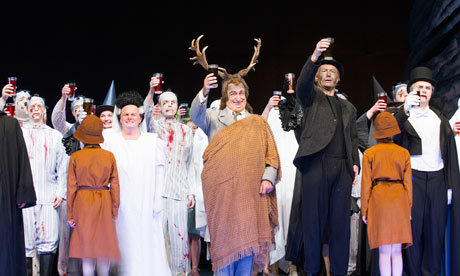
Richard Jones's production of Falstaff first appeared at Glyndebourne four years ago with, by all accounts, a few rough edges. But in its latest incarnation, which has been revived by Sarah Fahie, everything falls perfectly into place. In Ultz's designs, Jones's updating to late-1940s austerity Britain is a gently affectionate dissection of the English class system, from top-hatted Eton schoolboys to mischievous Brownies, from the crumbling foundations of John Falstaff's own aristocratic background through the aggressive middle-class aspirations of the Fords, still digging for victory in their suburban garden, to the streetwise opportunism of Pistol and Bardolph.
From the animatronic cats to the well-drilled rowing crew, everything is beautifully observed; none of the humour is forced, and musically it unfolds just as naturally and unselfconsciously, too. The credit for that goes to Mark Elder, whose account of the score is witty, buoyant and wonderfully humane, missing nothing. He is conducting the Orchestra of the Age of Enlightenment and while their period instruments do not alter the soundworld radically, there are enough shifts of emphasis to create some unexpectedly new perspectives and bring a transparency that suits the generally light-voiced cast perfectly.
Laurent Naouri is the Falstaff this time, with just enough sense of old-world privilege to make his disdain for Graham Clark's Dr Caius dismissively haughty, and enough surviving charm to make his pursuit of the Windsor wives not entirely fanciful. Ailyn Pérez is Alice, Lucia Cirillo is Meg (the decrepit husband Jones invents for her is a nice touch); Susanne Resmark is the formidable ATS-uniformed Mistress Quickly. Roman Burdenko's rather unconvincing and almost wordless Ford is a disappointment, but the young lovers, Antonio Poli and Elena Tsallagova, make a beautifully matched couple. It is altogether a captivating, joyous evening.
• What have you been to see lately? Tell us about it on Twitter using #GdnReview

